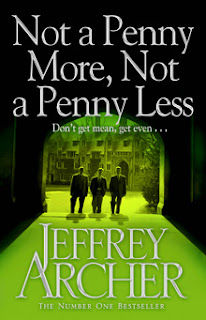A Review of Not a penny more, not a penny less by Jeffrey Archer
It might be because
of being more demanding than usual that I did not really enjoy this book. Or
may be it was just not good enough for my taste. To put it in the shortest
possible way is that it lacks the emotional intensity: the excitement, the
shock, the despair and the exhilaration. The characters behave in a strange
mechanical way and there are more figures and mathematics of gambling and speed
driving than I can deal with. Here's an account of the main characters playing
something (whatever) at a casino.
"The next hand gave Jean Pierre a three, Harvey a seven and the young man
a ten. The dealer drew himself a seven. Jean Pierre drew an eight and doubled
his stake to six francs and then drew a ten–vingt-et-une. Jean Pierre did not
blink. He realized he was playing well and that he must not draw attention to
it, but let Harvey take it for granted. In fact Harvey hadn’t even noticed him:
his attention was riveted on the young man on his left, who seemed anxious to
make a gift to the management on every hand. The dealer continued, giving
Harvey a ten and the young man an eight, leaving them both no choice but to
stick. The dealer drew a ten, giving himself seventeen. He paid Jean Pierre,
left Harvey’s stake and paid the young man."
The same monotone
continues through several pages and after that a new monotone starts for the
next several pages. My point is I do not know what is meant by giving a three
or a seven or drawing an eight. That are only facts and figures of a specific
game whereas I am interested in the characters and how they are feeling sitting
next to their arch enemy. The same game could be turned into a thrilling match
if only the writer decided to take us into his characters' minds instead of
focusing on the comings and goings of cards in a gambling show.
The only thing that
I liked about this book and am willing to give it three stars (which means
saying I like it) is that it is quite well researched. The author takes us to
many placed from art museums to casinos to the great Oxford university's annual
celebrations. The description of the strange royal trends of Oxford university
is the most interesting thing in this book, though it is also described in the
same monotone. I also liked the last couple of chapters better than most of the
book. And well, I liked the concept as well: "Don't get mean, get even..". The story was different because all the four main characters decided to systematically get back what was rightfully theirs in a thoroughly planned manner instead of the usual emotional drama. Though it was too thorough and free from emotions to be close to being natural.
The story is
something like TV thrillers or may be a combination of such thrillers. A
wicked, corrupt businessman launches a company, spread some rumours to raise the
price of its shares, makes an innocent, enthusiastic young business school
graduate into his scapegoat to get people purchase all the shares within a
short time and then next day the company quietly vanishes. Now there were four
people who had whimsically put their faith in the company by trusting the young
representative of the company who had enthusiastically advertised the expected
raise in share prices. All four of them ill-advisedly spent all their savings
to buy these shares and suffered from the shock of their life when they
realized that all their money was sunk as the company stopped functioning. They
get together and make a plan to get their money back. The plan involves the
participation of all four of them and it is decided that each of them will come
up with a plan according to his professional expertise while all others will
help to conduct the plan. It is rather a strange assortment of an Oxford
professor, a doctor, a curator of an art museum and a British lord (who was no
good really but still a lord). Well, the manner in which they set upon their
mission is rather like taking up a research project. At least the description
is like a research report or may be the way in which police might document an
investigation. It was well-planned and well-executed and the story had its fair
share of surprises in the end as well. Only if it had been just as well
narrated, it could be one of my favourites.
I don’t call it a
waste of time but I think I would be rather reluctant to read Jeffrey Archer's
novels in future. In fact, this book was highly recommended by a close friend
who herself had a great time with this book. I myself think that it was a pretty
good story but for the monotone and the lack of feeling and the overa-bundance
of figures and uninteresting details.

No comments:
Post a Comment